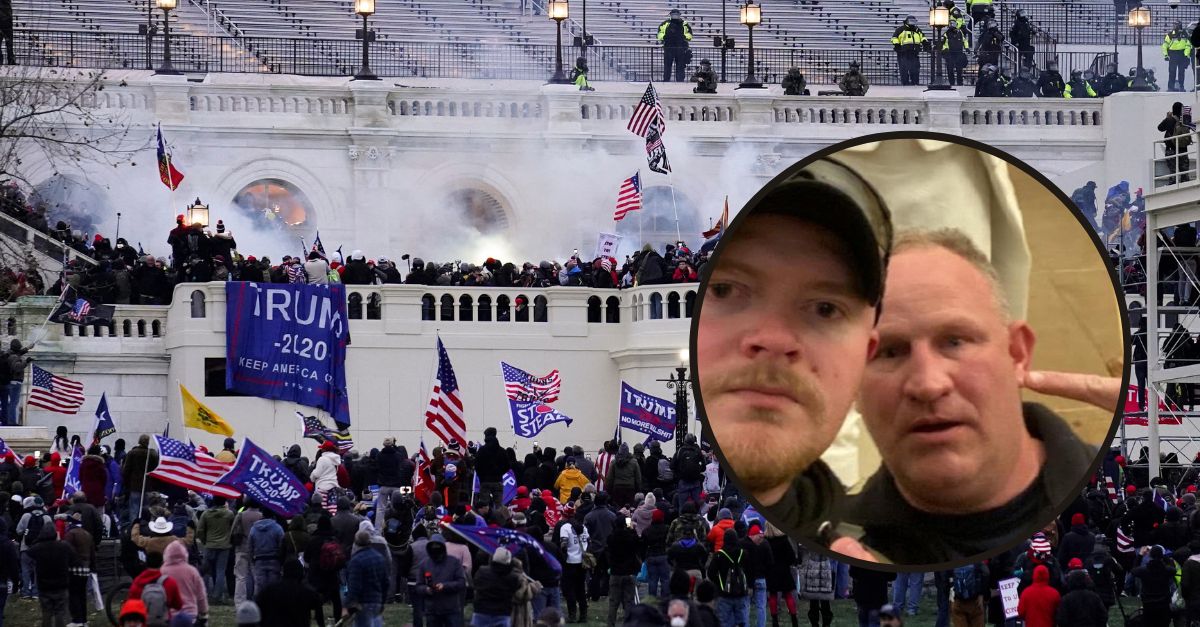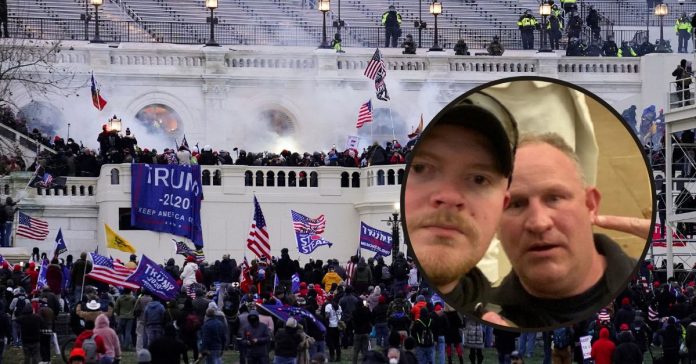
Background: Violent insurrectionists loyal to President Donald Trump, storm the Capitol, Jan. 6, 2021, in Washington.(AP Photo/John Minchillo, File). Inset: Jacob Fracker on left; to his right, former Rocky Mount, Virginia, patrol sergeant Thomas Robertson. (File courtesy of trial exhibits compiled for U.S. District Attorney’s Office)
In a ruling with major implications for Donald Trump and hundreds of accused rioters charged with storming the U.S. Capitol on Jan. 6, 2021, a federal court Friday again upheld a key finding in the felony conviction of a Virginia police officer who jurors agreed engaged in his own self-described “counterinsurgency” before obstructing Capitol police and disrupting congressional proceedings that day.
The former police officer is Thomas Robertson of Rocky Mount, Virginia, and the pivotal ruling was delivered by way of a 2-1 opinion from the U.S. Court of Appeals for the District of Columbia.
A jury found Robertson, then 49, guilty on six counts, including five felonies. Those included: obstruction of an official proceeding, civil disorder, entering and remaining in a restricted building or grounds while carrying a dangerous weapon, disorderly and disruptive conduct in a restricted building while carrying a dangerous weapon; and tampering with a document or proceedings. Robertson was also found guilty of misdemeanor disorderly conduct.
It was the language of that obstruction charge — 18 USC § 1512 (c) — on which Robertson, and many Jan. 6 defense lawyers alike, have hung their hopes for a winning argument on appeal.
Specifically, Robertson had pointed to the use of the term “corruptly” in the statute when he sought to overturn the verdict. He argued that he did not storm the Capitol out of ill intent or maliciousness to target Congress and delay proceedings. Instead, he premised his appeal on the notion that he genuinely believed the 2020 election was “stolen” and felt he had a right to stalk the halls of the Capitol to express himself.
But the 80-page opinion from U.S. Circuit Judges Florence Pan, with a concurrence by U.S. Circuit Judge Cornelia Pillard, highlighted how the former police officer’s attempt to limit the word “corruptly” to “his preferred, single meaning is wholly unconvincing.”
“It finds no support in the statute and is contrary to precedent,” Pan wrote.
Robertson declared an intention to join a “counterinsurgency” and planned to engage in “open armed rebellion,” the judge noted, rolling through Robertson’s conduct at the Capitol.
Then off-duty from his work as a patrol sergeant for Rocky Mount, Virginia police, Roberston drove to Washington, D.C., with his friend and fellow off-duty officer Jacob Fracker. They came with gas masks and Robertson wielded a large wooden stick to push back officers ordering him to stand down or leave the overrun building altogether.
Pan noted Robertson used the stick to swing at police officers and wielded it in a show of intimidation by bashing it loudly on the ground. He also joined a crowd he described as “out of hand.” And he did this, the judges noted, as the mob continued “surging into the Capitol building despite the blaring of alarms and warnings by police officers that the area was restricted.”
Then once inside, Robertson “enthusiastically” joined the riot that had forced both houses of Congress to halt proceedings.
Before his arrest — but after authorities told him his arrest was imminent — Pan emphasized how Robertson then hid a phone containing key evidence before procuring another. On that phone, police found a text message where Robertson wrote, “anything that could have been problematic, has been destroyed.”
These factors combined with the brute force he deployed in the thick of the rioting proved he acted corruptly, the judges found.
“Using force to obstruct, influence, or impede a congressional proceeding is plainly wrongful and therefore corrupt,” Pan wrote.
Robertson was sentenced to 87 months, or just over seven years, in prison for his conduct at the Capitol on Jan. 6.
The circuit court’s ruling also signaled that this case is very likely destined for the U.S. Supreme Court (citations omitted):
Whether [the statute] applies to defendants who obstruct Congress by means of only “minor advocacy, lobbying, and protest offenses,” or by “non-criminal tortious activity,” is beyond the scope of our “limited” review and should be decided in a case that requires resolution of that question. Here, we have no trouble rejecting Robertson’s specific claim that the evidence was insufficient to support a finding that he acted “corruptly” when he participated in the Capitol riot. A jury could find that he used independently felonious means to obstruct a congressional proceeding, which falls within the core meaning of “corruptly.”
Critics of the “corruptly” verbiage, like Robertson, contend that his conduct was not “corrupt” because it was not done with the “consciousness of wrongdoing” or “knowing dishonesty.” To act “corruptly,” the argument goes, one would have to use unlawful means to achieve a desired unlawful purpose or outcome.
Not so, the judges found — at least, not across the board.
“Not all attempts to obstruct or impede an official proceeding involve acting corruptly. For example, a witness in a court proceeding may refuse to testify by invoking his constitutional privilege against self-incrimination, thereby obstructing or impeding the proceeding, but he does not act corruptly. In contrast, an individual who obstructs or impedes a court proceeding by bribing a witness to refuse to testify in that proceeding, or by engaging in other independently unlawful conduct does act corruptly,” the ruling stated.
Although Robertson previously endorsed a district court’s definition of the phrase “corruptly,” now he argues that the proper definition of it holds a different meaning altogether, Pan noted. Robertson claims that the term describes only “an act dishonestly done ‘with a hope or expectation of either financial gain or other benefit to oneself or a benefit to another person,’” and that any benefit he could have hoped to derive from his action at the Capitol were “too remote.”
Unpersuaded, the opinion asserts that the plain meaning of the word satisfies his guilty convictions, while also acknowledging that it “[does] not write on a clean slate” in terms of defining ‘corruptly.’”
Congress has not defined the word in the statute to mean something else, either.
In an Enron-related case before the Supreme Court in 2005, the high court found the “natural meaning of ‘corruptly’” was clear when it was associated with “wrongful, immoral, depraved or evil” acts. This April, a federal appeals court found that Jan. 6 rioters could in fact be prosecuted for obstructing Congress but the question of the language of “corrupt” divided the panel. In a dissent, U.S. Circuit Judge Justin Walker essentially argued that for something to be corrupt, there must be an unlawful benefit obtained.
Walker, however, was bested by the court majority which found Robertson was properly tried, charged and convicted nonetheless due to the reams of evidence jurors found proved beyond a reasonable doubt that he acted unlawfully in a bid to keep Trump in power.
In Friday’s ruling, U.S. Circuit Judge Karen Henderson dissented, saying that Robertson only meant to protest the election results and did not seek another benefit. Hundreds of other Jan. 6 rioters have been charged with the statute, including none other than former President Trump.
Have a tip we should know? [email protected]

